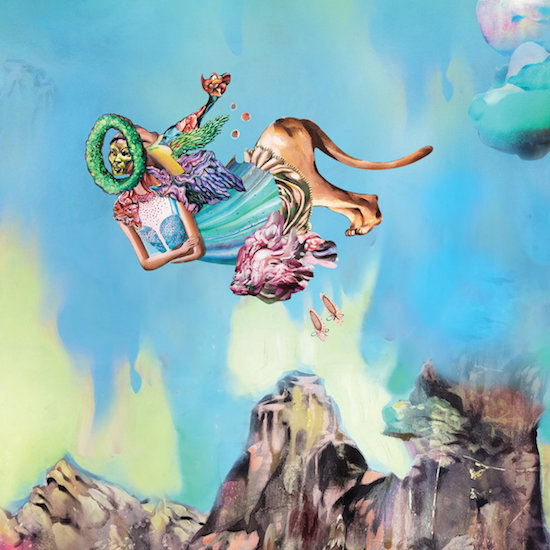Nadah el Shazly is part of a burgeoning underground music scene in Egypt that has been rightly garnering more and more interest of late. Having started out in music in a Cairo punk band singing Misfits covers, El Shazly gradually moved into homemade electronic music before alighting on the mystical hybrid between rock, avant-garde music and electronica that forms the core of Ahwar (“marshlands” in Arabic). With Libyan guitarist Sam Shalabi and fellow Cairo native Maurice Louca (both members of The Dwarfs Of East Agouza with Alan Bishop) adding their prodigious talents to the fray, El Shazly has joined together past and present to position herself at the forefront of the new North African music scene.
Her voice is singularly seductive throughout, even on the album’s wilder moments (more on those later). On the lengthy, mostly acoustic ‘Barzakh (Limen)’, she mutters broodingly over chugging acoustic guitar chords as flutes, fiddles and muted percussion create a stark, intensely morose atmosphere in the background. El Shazly’s diction is precise as she lingers over the lyrics, slowly releasing them in unhurried flows. A stark electronic passage takes over from the acoustic instruments midway through the track and her voice soars into the upper register, heavy with emotion. Comparisons have been made with singers like Annette Peacock or Björk but these fall way off the mark as El Shazly’s singing is distinctly Egyptian in style, her beautiful voice contorting in ways few western singers are able to, bar the underrated American folk singer Jessika Kenney.
If ‘Barzakh (Limen)’ and a cover of legendary Egyptian singer Sayyid Darwish’s ‘Ana ‘Ishiqt (I Once Loved)’ indicate a deep connection to Egyptian musical traditions, El Shazly is equally unafraid to experiment. ‘Ana ‘Ishiqt (I Once Loved)’ features similar arresting vocals from the singer as she floats over a tapestry of kalimba (thumb piano) and harp notes but she also introduces gristly noise electronics and blaring sax into the mix, adding to the song’s forlorn desperation. Opener ‘Afqid Adh-Dhakira (I Lose Memory)’ is a blast in comparison, a demented sonic exploration which opens with mutated vocals blaring all over the musical spectrum as brooding string drones flutter in and out of focus. Gradually, fitfully, the assembled musicians kick into a Can-like funk-rock rhythm with El Shazly sussurating the multitracked vocals. The song progresses at a lumbering pace, full of tempo shifts and weird effects before collapsing in on itself. At the crossroads of jazz, funk, rock and electronica all at once, ‘Afqid Adh-Dhakira (I Lose Memory)’ is a hazy, frightening, weird and wondrous labyrinth of a piece.
A deliciously retro keyboard riffs from Maurice Louca dominates ‘Palmyra’, clearly a lament for the destruction of the historic Syrian city and the album’s emotional heart, with El Shazly’s soaring vocals particularly affecting. The instrumental ‘Koala’, in contrast, is heavy and freeform, featuring a wonderful middle section of battling horns, drums, guitar and keyboards. It could almost be an early 70s Soft Machine jam, the interplay quite simply electrifying as it soars between experimental rock and avant-jazz territory. Closer ‘Mahmiya (Protectorate)’ is another showcase for Nadah el Shazly’s exquisite voice, as she stretches it far into the upper registers over delicately plucked oud notes and woozy slide guitar, and even it has its weirder moments, as ominous repeated piano chords and grim guitar arpeggios are allied to ethereal, haunting wordless vocals in the final section.
Ahwar is a perfect amalgamation of traditional Egyptian song with experimental takes on performance and instrumentation. And Nadah el Shazly’s is a voice, as both singer and songwriter, that will haunt your dreams for days after listening to this album.


